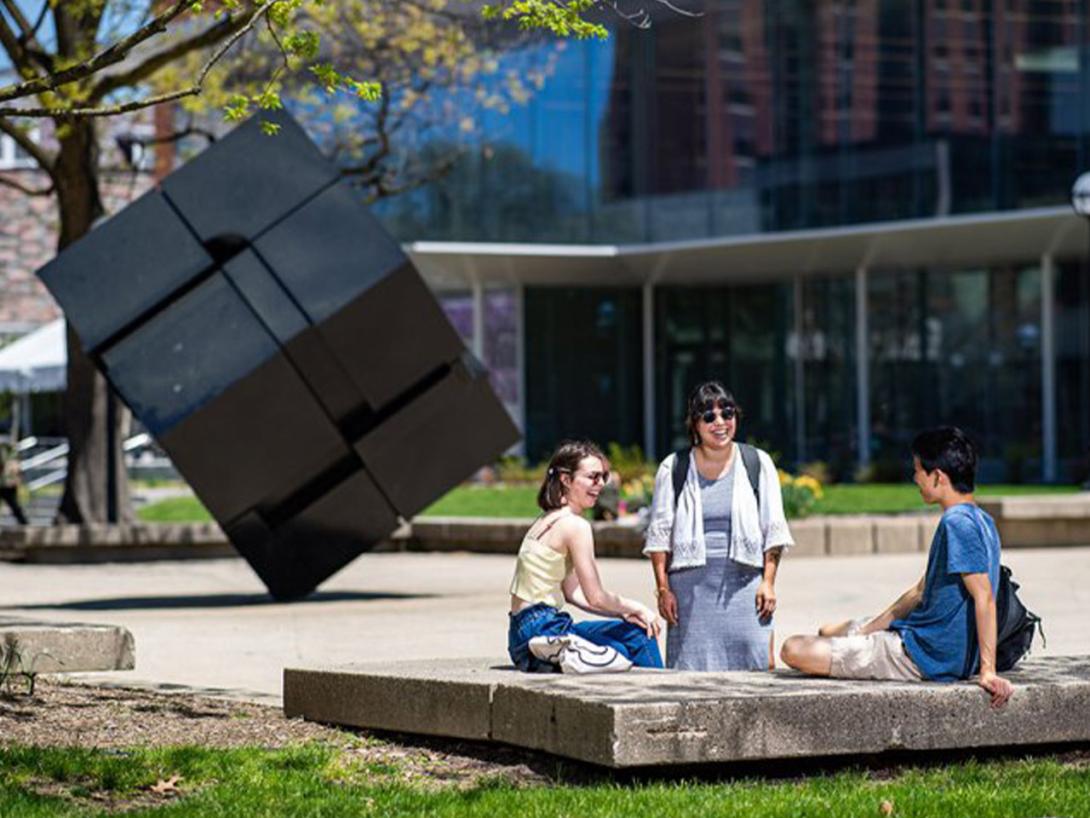September 20, 2024 | By Nick Pfost
The University of Michigan has launched the Difficult Dialogues Meet the Moment Initiative to help campus community members engage in productive conversations around topics that may be difficult to discuss.
The initiative is designed "to prepare faculty and staff to help one another and their students discuss difficult, sometimes contentious, topics that may emerge about issues such as the election and democracy, climate change and sustainability, and international conflict," said Tim McKay, LSA associate dean for undergraduate education.
It is made possible through a partnership with LSA Undergraduate Education; Student Life; the Raoul Wallenberg Institute; U-M Year of Democracy, Civic Empowerment, and Global Engagement; The Program on Intergroup Relations; and the Difficult Dialogues National Resource Center.
Difficult Dialogues will be directed this fall by Donna Rich Kaplowitz, on temporary assignment from The Program on Intergroup Relations to capitalize on urgency and momentum to build dialogic skills on U-M's campus.
The initiative includes national webinars that build those skills alongside a U-M campus hub for local training, resources, and support. Several opportunities will be led by IGR experts, including Kaplowitz, Kelly Maxwell, Stephanie Hicks, Deborah Slosberg, Patrick Kazyak-Albaladejo Muñiz, Cesar Vargas-Leon, Amanda Webster, and Jordan Hunter.
"We are living, working, and leading during a time of high conflict and increased political polarization," Kaplowitz said. "Many faculty and staff are seeking opportunities to build skills to engage one another and their students in difficult conversations. And this initiative, a new partnership between the national Difficult Dialogues National Resource Center (DDNRC) and U-M, seeks to do precisely that."
The goals of this initiative are to:
- Help campus community members build skills to lead others and engage in dialogues that include listening, perspective-taking, inquiry and critical reflection.
- Provide a welcoming context in which to learn and practice dialogic skills, competencies, and knowledge in how to facilitate such discussions in a broader context or setting; and
- Build confidence among faculty and staff to introduce opportunities for these conversations to occur.
The first fall offering is a national webinar called “Meeting the Moment: Workshop Series on Skills and Resources for Challenging Conversations on Campus,” put on by U-M Difficult Dialogues and DDNRC on September 27 from 2:00 - 3:30 p.m. It will focus on developing some of the core skills in dialogue across difference—deep listening and communication opportunities. Senior assistant dean Kelly Maxwell (LSA) and IGR associate director Roger Fisher will lead the session.
Upcoming webinar opportunities include:
- Oct. 17 — “Trauma Informed, Healing Focused Dialogues,” with the the Difficult Dialogues National Resource Center.
- Oct. 23 — “Hot Topics in the Workplace,” with IGR facilitators Patrick Kazyak-Albaladejo Muñiz and Cesar Vargas Leon.
- Oct. 25 — “Hot Topics in the Classroom,” with IGR faculty Stephanie Hicks and Deborah Slosberg.
Other sessions still to be scheduled in November are: “Deep Dive into Trauma Informed Dialogues,” “DDNRC Community of Care: Creating Mindful Post-Election Space and Strategies,” “Deep Dive into Mindful Post-Election Spaces,” and “Dialogue Across the Holiday Table.”
Details for the November sessions will be posted online at myumi.ch/difficult-dialogues. All November sessions are for U-M faculty, staff or students only, except for “DDNRC Community of Care: Creating Mindful Post-Election Space and Strategies,” which is open to the public.
Difficult Dialogues also is offering free one-hour coaching sessions to support U-M faculty and staff who are planning to host events or engage in critical conversations in their courses. The coaching sessions will be available for recommended pre-planning as well as follow-up.
Stay up to date with Difficult Dialogues opportunities by subscribing to their newsletter.
Read more

